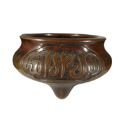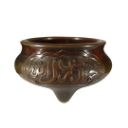The Shahada
Most inscriptions, like most actions carried out by devout Muslims, begin with the invocation of God’s name (basmala), ‘In the name of God the Merciful, the Compassionate’ (bism allāh al-rahmān, al-rahīm), or the Muslim profession of faith (shahada), ‘There is only one God. Muhammad is the prophet of God’ (lā elāha ellā allāh, Muhammad rasul allāh). The shahada upholds the central theme of the Qur’an: the unity or oneness of God (Allāh in Arabic).
The calligraphic ornaments around the body of our incense burner read as follows:
لا اله الا الله
Lā elāha ellā allāh
'There is only one God'
محمد رسول الله
Mohammad rasul allāh
'Muhammad is the prophet of God'
افضل الذکر
Afdhal al-dhekr
'The greatest praying'
The shahada and praises to God are the most typical additions to incense burners which might otherwise have ended up on Taoist or Confucian altars. One can imagine the diffusion of perfumed smoke from the body of our censer serving as a sensorial reminder of this fundamental creed in the practice of Islam.
If we want to understand why writing is a ubiquitous feature in Islamic art (and architecture), we must recognize that ‘the word’ (al-kalima) plays a pivotal role in the religion of Islam. The central miracle of the faith is that in the early seventh century (c. 610 AD), God sent down a revelation to the Prophet Muhammad through the Archangel Gabriel, in Arabic language. This revelation was later written down as the Qur’an.
The first words that God revealed to Muhammad were the opening five verses from Chapter 96, Surat al-Alaq (The Clot) which read as follows:
Recite in the name of thy lord who created,
Created man from a clot;
Recite in the name of thy lord,
Who taught by the pen,
Taught man what he knew not.
These verses sanctified the use of the pen from the birth of Islam and are deemed miraculous, because the Prophet himself was illiterate.
Read more about the art of Islamic calligraphy and about the chinese touch in the writing on this incense burner.


